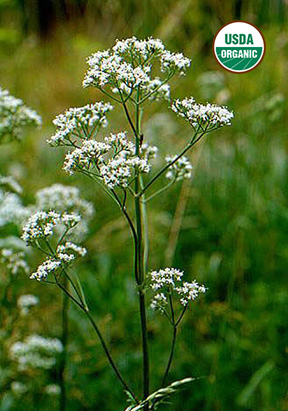
Valerian Root Powder

Herb Info
Great for anxiety, separation anxiety, insomnia, restlessness, seizures, epilepsy and stress from traveling in a car or plane.
Herb Description
BIOComplete Organic Valerian Root Powder
Also known as:
Valeriana officinalis. Common Valerian, European Valerian, Valeriana and Allheal.
Introduction:
Contrary to popular myth, the modern drug Valium is not derived from valerian, and there is no relationship at all between them. Valerian root does, however, have a long history of use as a sedative in Western Europe, dating back to the time of Hippocrates, (ca. 460-377 B.C). Originally native to Europe and parts of Asia but now common throughout North America, in the U.S. valerian root is widely used in sleep aids and sedatives in various forms including teas, tablets, and capsules. Often, valerian is combined with other herbs traditionally known to promote sleep including hops, passionflower, lemon balm, chamomile, and lavender. The root must be dried at temperatures below 105 degrees F (40 degrees C) for its medicinally active compounds to form. Anyone who has experienced the unpleasant “dirty socksâ€Â� odor of the roots would be surprised to learn that the pink or white flowers of this long-stemmed perennial are actually quite fragrant, and were used as a perfume in the 16th century. Ancient medical texts acknowledge the odor of the root by calling the plant phu. In teas, valerian tastes sweet and spicy if somewhat bitter.
Constituents:
Acetic acid, ascorbic acid, beta-ionone, calcium, caffeic acid, magnesium, manganese, quercitin, valeric acid.
Parts Used:
Dried root.
Typical Preparations:
Teas, tinctures and capsules. Can be combined with St. John's wort to increase its ability to reduce anxiety, or with hops and/or lemon balm to strengthen its sleep-inducing properties. Many people find the taste unpleasant and prefer to take it as a capsule or extract.
Summary:
Valerian is a calmative and tranquilizer. Its properties have been known at least since the time of Hippocrates, and it was prescribed by the ancient Greek physician Galen for the treatment of headaches, insomnia, nervousness, restlessness, menstrual problems, nervous stomach, and hysteria. Clinical trials have confirmed the use of valerian for treating insomnia, especially the insomnia that accompanies menopause. The advantage of valerian over tranquilizers such as Valium and Xanax is that it reduces sleep latency, the time required to fall asleep, without a period of bedtime drowsiness and without creating a "hangover" or grogginess the next morning. Valerian has greatest effect in treating chronic insomnia, rather than short-term sleeplessness. It also soothes the digestive system and may prevent cramping caused by irritable bowel syndrome.
Precautions:
If you use valerian for several months and suddenly stop using it, you may experience withdrawal symptoms such as headache, insomnia, racing heart, and general grouchiness, although rare. Reduce dosage of a period of about a week if you wish to discontinue using the herb suddenly.
This information has not been evaluated by the Food and Drug Administration.
This information is not intended to diagnose, treat, cure, or prevent any disease.
For educational purposes only.

